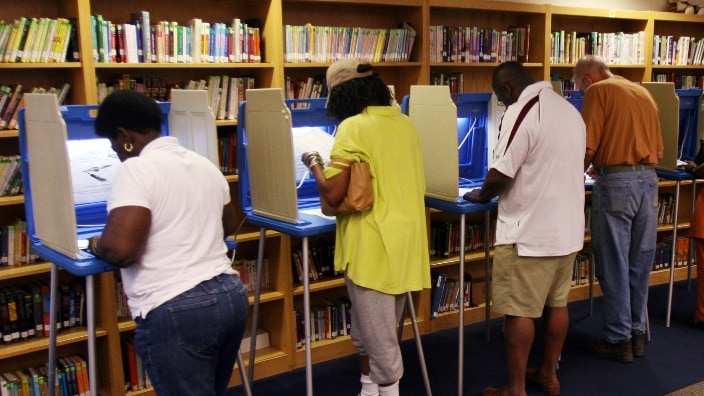NC judges: Felon voting ban rooted in discrimination
North Carolina’s ban, which cost some 70,000 people their voting rights, was overturned Monday by a panel of superior court judges.
North Carolina’s ban on voting by felons has been overturned by a state court — a restriction that has prevented some 70,000 people from casting ballots there.
According to The Charlotte Observer, current law meant that persons who had been previously incarcerated for felony convictions could not vote until their probation or parole sentences had ended — sometimes years after they were released. However, a federal lawsuit filed in 2019 and argued in 2021 challenged that law.
Voters cast ballots at the Williston Middle School polling station in Wilmington, North Carolina. The state’s ban on voting by felons has been overturned by a state court, a restriction that has prevented some 70,000 people from casting ballots. (Photo: Logan Mock-Bunting/Getty Images)
The judges wrote Monday that the law is unconstitutional for generally violating people’s rights, but also for being targeted at Black people. They wrote that the law “was enacted with the intent of discriminating against African American people and has a demonstrably disproportionate and discriminatory impact.”
The ruling in the case of Carolina Success Initiative versus Timothy K. Moore, in his official capacity as the Speaker of the North Carolina House of Representatives, now restores the voting rights of anyone who has been released from prison and rejoined society. It reportedly affects as many as 55,000 current potential voters.
The 1875 law was enacted by a state constitutional provision. Carolina Public Press reported last year that Orlando Rodriguez, an attorney for the state, admitted that the provision was created to specifically target Black North Carolinians. Additionally, he admitted that the law disproportionately affected Black voters at a rate high enough to sway local and statewide elections.
“Nobody has and nobody will stand up here and try to defend the very shameful history of using felony disenfranchisement as one of the many tools to suppress the political power of the Black community,” Rodriguez said.
The plaintiffs argued that keeping people from voting after they were released from prison is illegal under several different provisions of the state’s constitution, namely its Free Elections Clause.
According to WRAL, Article 1, Section 10 of North Carolina’s constitution says elections “shall be free.” Section 9 says they should be “frequent.” The terms were debated in another election law case in which Chief Justice Paul Newby found that the state’s Constitution does not require elections to be “fair.”
As it relates to the disenfranchisement case, Rodriguez argued that the court should analyze actions since the 1970s, which he said: “clearly indicate a trajectory toward improving the ability to have one’s rights restored.”
The plaintiffs argued that even the 1970s reforms were rooted in racism. “The story of felony disenfranchisement in this state is a story of violent white supremacy,” Stanton Jones, an attorney for the plaintiffs, said during his opening statements, Carolina Public Press reported.
Jones argued that white legislators in the 1970s were aware of the racist origins of the laws, yet they continued — and extended the disenfranchisement with racist intent.
Monday’s ruling was a 2-to-1 decision by the panel of three superior court judges assigned to the case. The dissenting judge, John Dunlow, wrote in his opinion, “No reasonable reading of the plain language N.C.G.S. 13-1 could be interpreted to disenfranchise any person.” He argued that the defendants should have won the case. However, only a majority was necessary to overturn the law.
The two other judges also ruled on a specific part of the lawsuit claiming that at least 5,000 people were being prevented from voting because they remained on post-release supervision only because they could not afford their probation or parole fees.
Republicans who defended the law can appeal, but it is not clear if they will.
TheGrio is FREE on your TV via Apple TV, Amazon Fire, Roku and Android TV. Also, please download theGrio mobile apps today!
The post NC judges: Felon voting ban rooted in discrimination appeared first on TheGrio.

